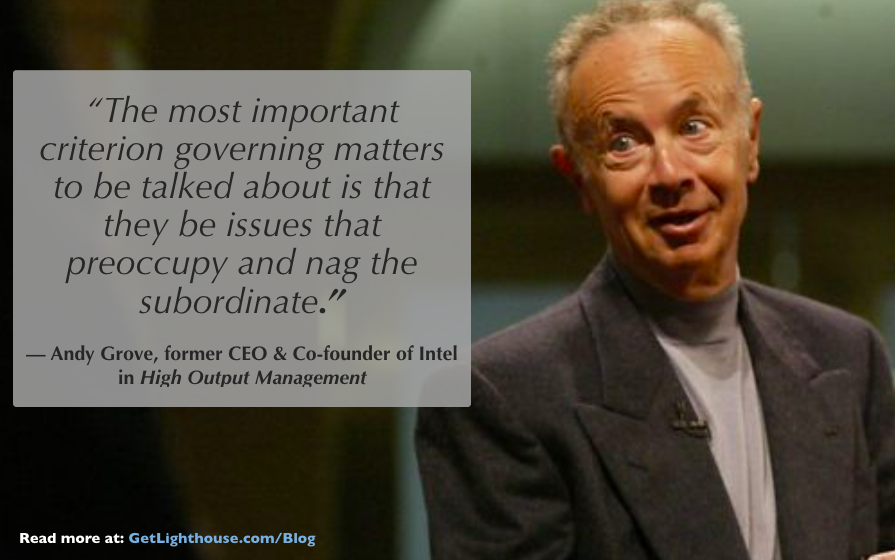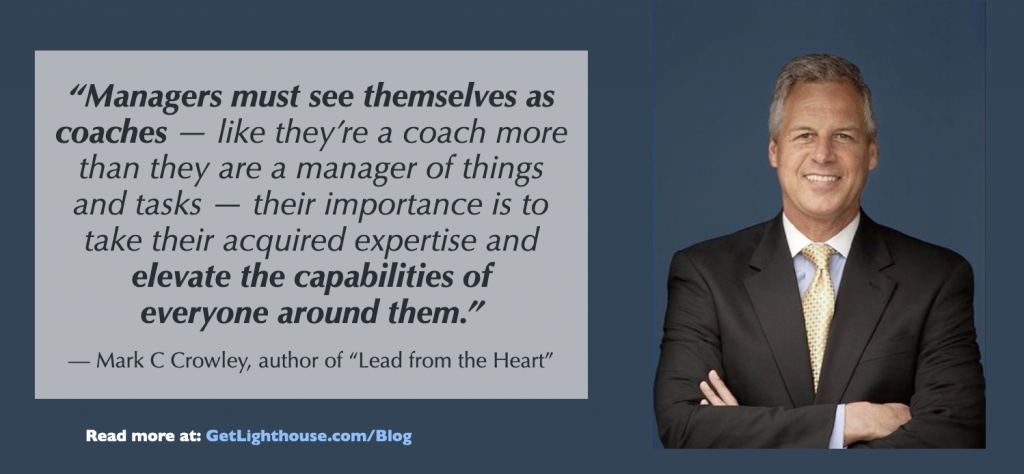Much has been written here and all over the web about what managers need to know about one on ones with employees and why you must have them.
But what about when you're an employee? Being new to one on ones, wondering what one on ones are for, and wanting to know what you can do to make the most of them applies to employees as well as their managers.
Whether you're a manager having one on ones with employees looking for tips to give to your team members on how you want them to approach their one on ones, or you're an employee looking to learn how to make the most of your one-on-ones, this post is for you.
Here are 10 tips for one on ones with employees you can use to ensure these check-ins are awesome for you and your manager.
Table of Contents: Making the most of one on ones with employees from their perspective
- Treat it as Your time
- Make rapport a two way street
- Be Brave: Trust them first
- Bring your half baked ideas
- Have a Problem? Tell them!
- Do Your Part. Be prepared
- Canceling 1 on 1s is not ok
- Have your tough conversations here
- Ask for feedback
- Make them actionable

How to Make the Most of Your Work One to Ones with Employees and Managers
Great one on ones don't just happen. They take effort and knowledge. You have to know how to answer questions like, "what are one on ones for?" and "how do we make the best use of the time?" Then, you have to put those answers into practice week after week.
If you follow these 10 tips below, whether it's you, the employee, or your manager following them, you'll have much better one on one meetings. This will make your work more enjoyable, improve your relationship with each other, and unlock many other benefits.

1) Treat it as Your time and really talk to your manager; one on one meetings are built for this
One-one-ones are a time for you to discuss the things that are important to you, and for your manager to focus on you with coaching, feedback, and questions for you.
If your manager tries to turn your one on ones into a status update, stop them. There are plenty of other times and ways you can keep them in the loop on what's going on in your day-to-day projects.
Bring things you want to discuss to your one-on-one. If you're having a hard time with a person, project, or personally, tell them. It's the only way they can empathize or help you.
When you do that, you're much more likely to develop a strong relationship with them and stay engaged at work. According to Gallup, employees who do have regular one on ones with their managers are "3 times more likely to be engaged than those who don't."
If you have questions, one on ones are the perfect time to ask them in private. Your manager will likely come with a few questions, and if you do as well, you'll be well on your way to having a great work one to one.
Further reading:
- Status Updates: Why they should never be part of your 1 on 1s, with 5 reasons to convince your boss to avoid updates that could have been an email during face-to-face time with you.
- How to Get Status Updates Out of Your 1 on 1s, a resource you can share with your manager to learn how to be a more efficient communicator and talk about the things that truly matter in your 1 on 1s.

2) Make rapport a two way street in your one on ones
Not every work one to one with employees and their manager is going to be serious. Especially for your first few, they should be about getting to know one another, so you build some rapport and trust.
Believe it or not, by getting to know each other beyond work, you will improve your work relationship with your manager. When you both know how the other person ticks and what they love outside of work, it's easier to understand them and where they're coming from.
As serial tech entrepreneur Omid Scheybani wrote about having a caring manager who really invested in their one on ones with employees:
"I saw how truly caring about someone as a person could unlock an infinite amount of trust and authenticity. It could tear down walls of fear and bridge oceans of uncertainty. Seeing how my manager wanted the best for me was my biggest motivation to exceed his expectations day after day after day."
If you're looking for an easy, softball question to warm up your manager you may not have a strong relationship with, ask them, "how did you get where you are today?" It's a safe, easy topic that anyone with some level of success will be excited to share with a captive audience.
You can also look around their office (or Zoom background) for anything interesting to ask them about. Chances are, if it's on their desk or hanging on the wall, it is meaningful to them and they'll be happy someone noticed and cared to ask.
Best of all, as you get to know them, they'll very likely reciprocate and ask you similar questions, putting you on your way towards strong rapport with each other. This then becomes the foundation for the rest of your improved working relationship with them.
Further reading:
- If you're unsure what to ask your manager to build rapport with them, we've got you covered. Here are 100+ Awesome Topics to help you learn how to build rapport.
- And if you need more convincing, here's Why Experts Agree You Should Build Rapport with Your Team and what benefits you can expect as a result of developing a relationship with them.

3) Be Brave: Trust them first
I know. It's scary to open up to someone you don't know well, but you can really help your manager if you share a little and give them a few things to go on.
There's nothing tougher for a manager than being in one on ones with employees where it's like pulling teeth to get anything out of you. Make it just a little bit easier for them by giving them a little trust first.
When you do open up to them, let them know what you want and see if they follow through. If they do, then it should get easier to bring things to them and your relationship and trust in one another will strengthen.
However, it all starts with you taking that first step. As American educator, author, and businessman Stephen Covey puts it:
“Trust is the highest form of human motivation. It brings out the very best in people.”
Further Reading:
- Building trust is a key part of creating psychological safety at work, and it can make you and your teammates more innovative.
- Want to build more trust with others? Stephen Covery's Emotional Bank Account concept is a great way to think about it.

4) Bring your half-baked ideas
In any other meeting, you usually need to bring a well-thought-out idea to present it to your colleagues. This is not the case for one on ones. They are a safe, more informal discussion.
If you have an idea to improve yourself, the team, or the company, this is a great place to float them and see if they're worth further investigation and refinement.
Use your one on ones to talk about whether an idea really makes sense or to simply ask, "why not?"
Not everything will get past a chat here, but it does take the pressure off what could be a really big deal to pitch your whole team on. Your manager can help you better understand whether the idea can work and what it might take to fully flesh it out.
Even if the idea doesn't work out, it's important to keep trying and thinking of ways to improve your team. It's why former Amazon CEO Jeff Bezos was quoted as saying:
"One area where I think we are especially distinctive is failure. I believe we are the best place in the world to fail (we have plenty of practice!), and failure and invention are inseparable twins.
To invent you have to experiment, and if you know in advance that it's going to work, it's not an experiment.”
Bringing that culture to your team, and listening to your managers feedback on it, is a great way to make yourself a more valuable part of your team.
Further Reading:
- Want to get support for your ideas? Learn how to get buy in step by step here.

5) Have a Problem? Tell them!
A manager can't help you with what they don't know. Something that looks important to you or obvious may be hard or impossible for them to see. If you don't tell them they can't help you fix it.
The worst thing that can happen to your manager is for them to get drawn into a constant reactive mode. That can easily happen if they only find out about problems once they're huge fires.
Fixing a problem when it's small is orders of magnitude easier than having to constantly triage big issues. And the beauty of one on ones is that in this specific time, no problem that matters to you is too small to bring up.
If it really is small, you may be able to get a solution in a matter of moments, but you'll never get help solving a problem your manager doesn't know about. Tell them!

6) Do Your Part: Be prepared
Your manager has a really full plate. They're in meetings all the time and have one on ones with everyone on your team. They're going to do their best to be prepared for your one on ones, and so should you.
If there are things that you want to talk about, jot a few notes down in a document or a notebook and bring them with you.
Bring questions, ideas, concerns, and feedback. Remind yourself what you talked about last time. A good two-way street on preparation makes for great one-on-ones.
This may seem like a small, simple tip, but if you feel like your meetings are a waste of time, or a broken record. Your preparation can make all the difference; a good manager will let you go first on anything you want to talk about, while even a poor manager will have a hard time forgetting (or ignoring) your needs if you're consistently bringing them up and doing your part to move the ball forward.
Further reading:
- To better prepare for your one on ones, always make a meeting agenda, which is one of your most powerful weapons.
- If you want ideas on what you might want to talk about, try asking yourself any of these 150+ 1 on 1 Meeting questions as a way to inspire new topics and break new ground with your manager.

7) Canceling 1 on 1s is not ok
It's going to happen. Your manager will be stressed and busy, and so they'll ask you, "Do we have anything pressing to talk about? Can we cancel this week's one-on-one?"
It will seem like you're doing them a favor, but you're hurting yourself. Don't let them off the hook for the one time every week or two that's for you.
Instead, ask to reschedule to a later day or time.
Do your part to give them a reason to keep your one to ones at work. You should always have something to talk about. If there's nothing pressing, that should be an opportunity to talk about your career development and growth, or high level ideas to improve the team.
There's hundreds of questions you can discuss in one-on-ones that benefit both of you that are all good reasons not to cancel a one-on-one.
Further reading:
- Find out all the reasons your manager shouldn't cancel your one to ones with: Never Cancel One-on-ones: 7 Reasons why you shouldn't.

8) Have your tough conversations here - make one to one meetings a place to solve problems
One on ones are private, safe conversations. If there's something you want to be critical or outspoken on, this can be a better forum than a full team or company-wide meeting.
By bringing it up in your one on ones, you avoid embarrassing anyone publicly, or having your candor be poorly received. Your manager may even be able to help coach you to be more prepared to bring it up at the right time and place for a broader audience.
When proposed changes come up for your team or a project, managers will often want to take the temperature with a few people privately before widely announcing.
If your manager becomes used to getting helpful, candid feedback from you in your one on ones, there's a good chance they will make you one of those people they consult.

9) Ask for feedback to help you improve, too
If you're bringing up the tough issues you need to discuss with your manager in your one-on-ones, there's a good chance they'll reciprocate. However, they're often distracted by other things so it never hurts to help them by explicitly asking for the feedback you want most.
While the best managers will coach you consistently without you asking, you can get a lot more from even an average manager if you take the time to specifically ask them.
And your one on ones are the perfect time to both ask for it, and later receive it.
Best of all, it can break the bad patterns that come with giving poorly constructed feedback in other situations.
Ever have a manager give you feedback in the "sh*t sandwich" format (i.e.- hollow praise, softened criticism, hollow praise)?
Managers don't tend to like it either, but they worry just giving straight feedback by itself is too harsh.
This is where one-on-ones are great. If you're already talking about all these other ideas in your one on ones, then taking a moment during them to talk about something you could have done better feels a lot less awkward for both of you. There is no need for the "bread" of the sh*t sandwich.
Further reading:
- Why the Sh*t Sandwich method fails and what your manager can do instead.
- Check if your manager does the following 6 things to get more feedback from you and your team - if not, you can share this post with them if they lament they're not getting enough feedback.

10) Make them actionable
It's great to have open, candid discussions with your manager in one-on-ones. However, if you never take any action on what you discuss, then you aren't really accomplishing much.
When you cover important issues in your one-on-ones, make sure you establish with your manager what both of you will do based on what you discussed.
This ensures your expectations stay aligned and you make progress on what's important to you.
Even small, incremental progress has been shown in studies to make you much happier. Researchers Teresa Amabile and Steven Kramer studied what made people most consistently happy at work and found progress was the single most important way to be consistently happy at work.
Don't underestimate what a few small steps can do to improve a situation for you. This is as true in the tasks and projects you do day to day as it is making sure there is regular progress on what you talk about in your one on ones.
Further reading on how to make the most of one on ones with employees:
- Why 1:1 Meetings are So Valuable + How to Max Their Value; one of our best posts on the benefits of having 1:1s. If you don't already believe in the power of these meetings, this will change your mind.
- Here's our most comprehensive guide to one on one meetings here, with suggestions on what to talk about, how to prepare, how often you should have them, and more.
- How to Have Effective 1 on 1 Meetings with Your Manager, 7 things to help you take charge of them and get your manager to become truly invested in your relationship.
- 3 Ways to Better Manage Up By Developing Empathy, a post to help you understand your manager's perspective and anticipate their needs.
Are you and your managers wasting their one on ones?
There is no greater investment to make in your team than having one on ones. Yet, done poorly they’re a huge waste of time.
That’s why we made the 1 on 1 Master Class. You and your fellow managers learn step by step how to supercharge these meetings to motivate your teams, fix problems, coach your people, and much more.
You can learn how Lighthouse Lessons can help your leaders like we helped SeedBox Technologies by signing up here.





